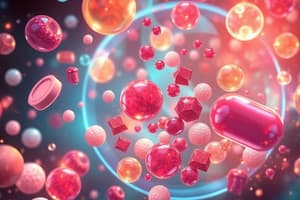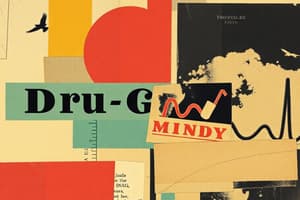Podcast
Questions and Answers
What is the therapeutic action of an analgesic?
What is the therapeutic action of an analgesic?
- Controls cardiac arrhythmias
- Relieves pain without causing loss of consciousness (correct)
- Neutralizes acid
- Produces a lack of feeling
What is an anesthetic?
What is an anesthetic?
An agent that produces a lack of feeling, may be local or general depending upon the type and how administered.
What is the purpose of an antacid?
What is the purpose of an antacid?
An agent that neutralizes acid.
What does an antiarrhythmic do?
What does an antiarrhythmic do?
What is acetaminophen used for?
What is acetaminophen used for?
What is ibuprofen classified as?
What is ibuprofen classified as?
Which of the following are examples of antacids? (Select all that apply)
Which of the following are examples of antacids? (Select all that apply)
What is the main function of an antidepressant?
What is the main function of an antidepressant?
What is the role of an anticoagulant?
What is the role of an anticoagulant?
What do anticonvulsants treat?
What do anticonvulsants treat?
What is the action of an antidote?
What is the action of an antidote?
What is an antihistamine?
What is an antihistamine?
Which drug is classified as an antiviral?
Which drug is classified as an antiviral?
Select the drugs that are considered antifungal agents.
Select the drugs that are considered antifungal agents.
Study Notes
Analgesics
- Acetaminophen (Tylenol) and ibuprofen (Advil, Motrin) are common analgesics that relieve pain without causing loss of consciousness.
- Analgesics are categorized under non-opioids (like acetaminophen) and NSAIDs (non-steroidal anti-inflammatory drugs like ibuprofen).
Anesthetics
- Lidocaine (Xylocaine) and procaine (Novocain) are anesthetics that induce loss of sensation, either localized or general based on the method of administration.
Antacids
- Antacids, including Mylanta, Aludrox, and milk of magnesia, neutralize gastric hydrochloric acid, easing heartburn and indigestion.
Antiarrhythmics
- Drugs like lidocaine HCl (Xylocaine) and propranolol HCl (Inderal) control and prevent cardiac arrhythmias, ensuring a regular heart rhythm.
Antianxiety Agents
- Benzodiazepines such as chloridazepoxide HCl (Librium) and diazepam (Valium) help alleviate anxiety and muscle tension.
Antibiotics
- Cephalosporins (Rocephin) and penicillins (Zosyn, Augmentin) are antibiotics effective in inhibiting or destroying microorganisms.
Anticholinergics
- Atropine and scopolamine are anticholinergics that block the parasympathetic nervous system's actions, which can reduce secretions and digestive activity.
Anticoagulants
- Heparin sodium and warfarin sodium (Coumadin) prevent blood coagulation, essential for managing or preventing blood clots.
Anticonvulsants
- Medications like carbamazepine (Tegretol), ethosuximide (Zarontin), and phenytoin (Dilantin) reduce the frequency and severity of seizures in epilepsy patients.
Antidepressants
- Imipramine HCl (Tofranil) and monoamine oxidase inhibitors (MAOIs) such as isocarboxazid (Marplan) treat various types of depression.
Antidiarrheals
- Agents like kaopectate, Lomotil, and Pepto-Bismol prevent or relieve diarrhea, helping restore normal bowel function.
Antidotes
- Naloxone is an antidote that counteracts the effects of opioid overdose.
Antiemetics
- Drugs such as Dramamine and Marinol prevent or relieve nausea and vomiting, useful in various medical contexts.
Antifungals
- Medications like Diflucan, Lamisil, and Monistat-3 treat infections caused by specific fungi, including candidiasis.
Antihistamines
- Allegra and Benadryl prevent histamine's actions, effectively managing allergic reactions and symptoms of hay fever.
Antihyperlipidemics
- Lipitor, Lopid, and Zocor are used to lower elevated lipid levels in the blood, reducing the risk of cardiovascular disease.
Antihypertensives
- Clonidine HCl (Catapres) and metoprolol tartrate (Lopressor) are prescribed to manage high blood pressure effectively.
Anti-inflammatories
- Aspirin and ibuprofen (Advil, Motrin) are common anti-inflammatories that reduce inflammation and relieve pain.
Antimanics
- Lithium is used to treat manic episodes associated with bipolar disorder, stabilizing mood.
Antineoplastics
- Busulfan (Myleran) and cisplatin (Plantinol) inhibit the replication of neoplastic (cancer) cells during chemotherapy.
Anti-Parkinsonian Agents
- Medications like L-Dopa and Requip provide symptomatic relief for Parkinson's disease patients.
Antipyretics
- Acetaminophen (Tylenol) and aspirin reduce fever, helping to alleviate discomfort during illnesses.
Antituberculosis Agents
- Medications such as Mambutal and Rifadin are used specifically in the treatment of tuberculosis infections.
Antitussives
- Benzonatate (Tessalon) and codeine suppress coughing, providing relief from persistent coughs.
Antiulcers
- Axid and Zantac are agents for treating active duodenal ulcers and other hypersecretion conditions of the stomach.
Antivirals
- Denavir and Tamiflu combat specific viral diseases, including influenza, by inhibiting viral replication.
Studying That Suits You
Use AI to generate personalized quizzes and flashcards to suit your learning preferences.
Description
Test your knowledge on the classification of drugs and their therapeutic actions with this set of flashcards. Each card provides definitions and examples of various drug categories, including analgesics, anesthetics, and antacids. Perfect for students in healthcare or pharmacy-related studies.



